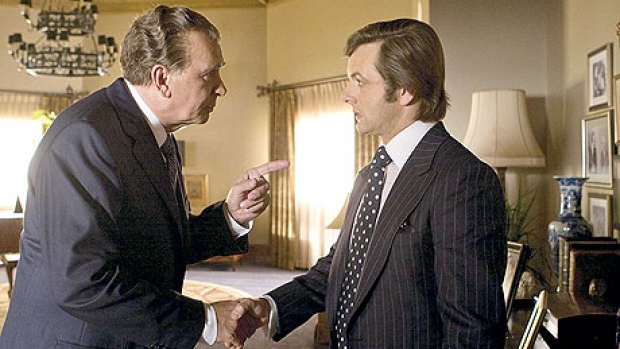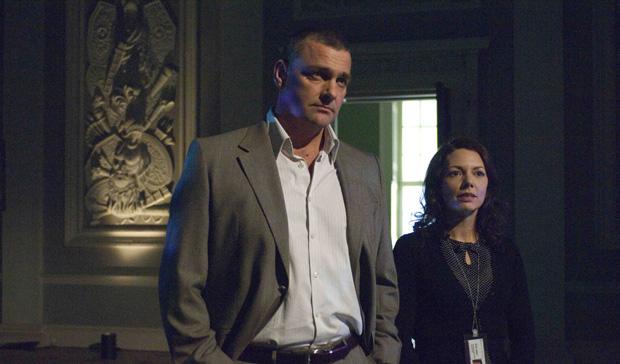
By Ray Bennett
BERLIN – “Scott Walker — 30 Century Man” is presented as a straight documentary about an American pop singer who had a couple of U.K. hits in the 1960s as a member of a boy band and has gone missing ever since, but it plays like the slyest of spoofs.
According to Stephen Kijak’s film, Walker is a shadowy legend in the music business whose determination to make albums in the face of almost complete indifference by record buyers ranks him as a lost god of rock alongside Brian Wilson.
There might be genuine Walker fans who wish to see their forgotten hero given his due, but those who have not acquired that strange taste will find the film hard to take unless it is viewed as a dead-on parody. It could achieve must-see status among pop ironists. The film is screening here in the Panorama Documentaries section.
There was a small group of American singers in England in the ’60s who were well-liked because they were so screamingly funny such as Gene Pitney, P.J. Proby and Scott Walker. Unheralded at home, they had big, tortured voices, featured overwrought arrangements on their records, took themselves with absolute seriousness and spoke the most amusing twaddle.
Walker arrived as part of the Walker Brothers, a boy band in which no one was named Walker and who were not brothers. Their biggest hit was “The Sun Ain’t Gonna Shine Any More,” a Bob Crewe and Bob Gaudio song that Frankie Valli had recorded earlier without success. They made a couple of albums, followed by solo outings by Scott, and then it was all over.
Although no one else appears to have been curious, Kijak’s film asks just what this missing genius has been up to for the past 20 or 30 years. He has a satirist’s ear for the telling comment. David Bowie, the film’s executive producer, talks about how influenced he was by Walker even though he bursts out laughing when he’s played one of his songs. Legendary transsexual arranger Angela Morley, previously Wally Stott, says Walker would ask for a bit of Sibelius here and some Delius there, but when she played one of the star’s tracks, he asks, “Is that one of mine? It’s so long ago.”
Brian Eno, Jarvis Cocker, Damon Albarn and others rhapsodize about Walker’s poetry and imagery, and naturally Sting is on hand to observe of Walker’s songwriting: “It reminds me of the darkness behind the romanticism.” Of course it does.
Walker’s perfectionism over precisely the right sound he demands for his records is demonstrated by showing him listening patiently to a man punching a slab of meat and directing him on the pace and speed of the strikes so that in the end it sounds exactly like a man punching a slab of meat.
Walker is seen at length talking about his music and how he can’t listen to it once it’s been recorded, though the film allows him to wail away ad nauseum. “It’s a nightmare. I never listen to it again,” he says. As Neil Innes says in “The Rutles,” he’s suffered for his music, now it’s our turn.
SCOTT WALKER — 30 CENTURY MAN
Missing in Action Films
Director-screenwriter: Stephen Kijak
Producers: Mia Bays, Stephen Kijak, Elizabeth Rose
Executive producer: David Bowie
Director of photography: Grant Gee
Editors: Grant Gee, Mat Whitecross
Running time — 95 minutes
No MPAA rating
 An attempt at a throwback to the New Wave, the film follows two brothers as they deal with the women in their lives in very different ways.
An attempt at a throwback to the New Wave, the film follows two brothers as they deal with the women in their lives in very different ways.









Time for national treasure Kate Moss to help the workers
By Ray Bennett
When Kate Moss was pilloried by the tabloids and began to lose contracts because of alleged drug use, CNN asked me on to talk about what she should do about it.
There was a guy from People Magazine on, too, and CNN clearly wanted me to agree with him that the supermodel should rush to confess her sins on TV or in one of the celebrity magazines or red tops. My advice was the opposite.
I said she should disappear, say nothing and keep working; things would come around. She did just that, and today she is back on top as she opens a new clothing line at Topshop. I say good luck to her.
Kate Moss doesn’t make awful pop records, shabby television shows or lousy movies. She doesn’t rabbit on to radio or TV interviewers. She just does her job, which is to look dazzlingly beautiful in advertisements, and she does it exceedingly well.
To spot her versatile and eye-catching features on posters and in commercials when traveling abroad is a sweet reminder of home. She is a national treasure.
Which is all the more reason she should follow the advice of Mary Riddell in the Observer Sunday and help improve the lives of the people who work so hard to make the clothes she hawks.
To add 10p to the cost of each item of clothing could double a ragtrade worker’s income, Riddell cries: “Come on Kate, lead the way.”
International Workers’ Day tomorrow, would be a fine time to do it. Come on, Kate!